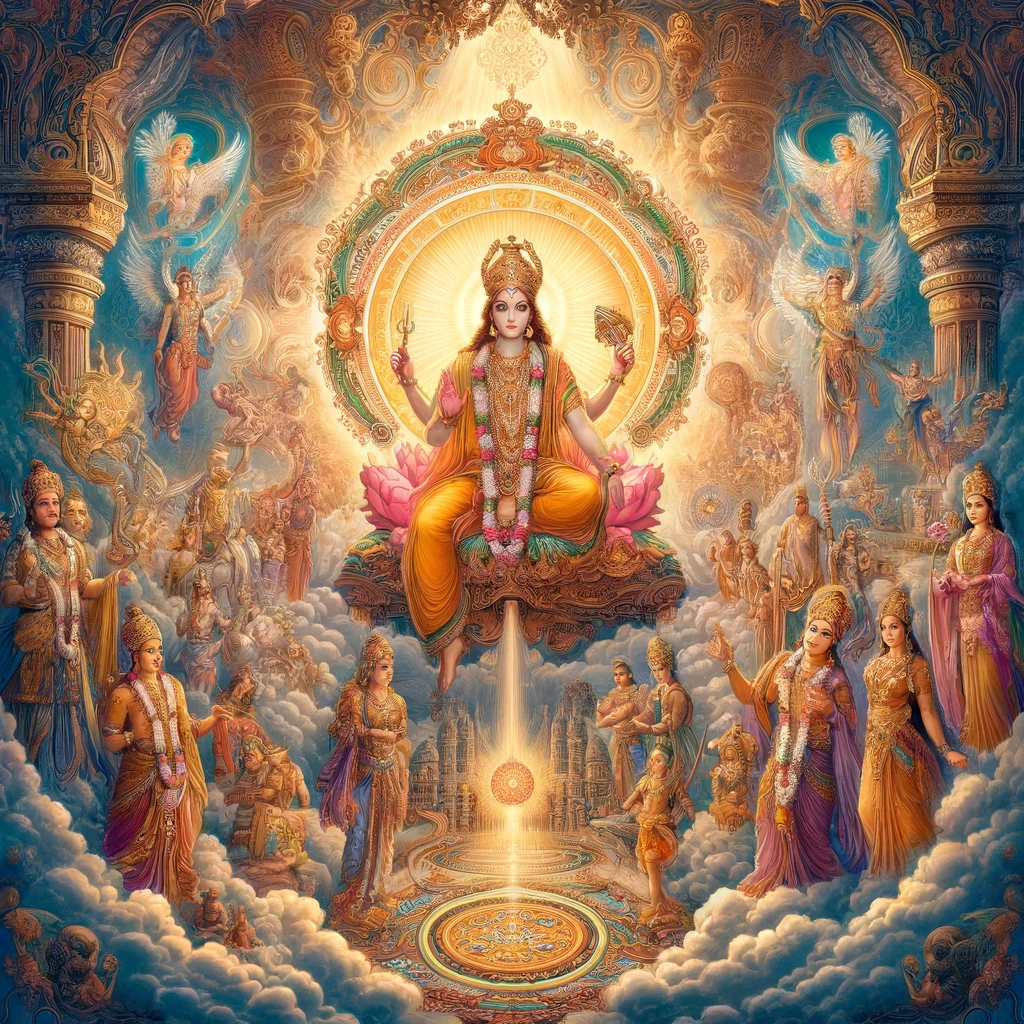Lord Vasuda, who opens the door to knowledge and bestows liberation, is the protector of the well-being and security of His devotees.
Among the gods, there is a group known as the 'Vasus,' and they are called the 'Ashtavasus' (eight Vasus). Among them, Agni (fire) is the prominent one. Agni is the chief symbol of the divine in fire. The worship of Bhagavan is primarily done through Agni in ceremonies on Earth. Bhagavan Vasu is the one who assigned this role to Agni. Bhagavan Vasu is the divine who bestows immense wealth to His devotees and resides prominently in the heavens.
Nikarupa" means having infinite forms. Bhagavan manifests Himself in countless forms within each individual and fills the entire universe as the all-pervading formless divine presence. As mentioned in the Narayana Sukta:
“ತಸ್ಯಾಂತೆ ಸುಶಿರಂ ಸೂಕ್ಷ್ಮಂ ತಸ್ಮಿನ್ ಸರ್ವಂ ಪ್ರತಿಷ್ಟಿತಂ”, tasyāṃte suśiraṃ sūkṣmaṃ tasmin sarvaṃ pratiṣṭitaṃ.
It means that within the subtlest and holiest place in our hearts, Bhagavan resides. The all-pervading power that controls the entire universe is within the tiny space of our heart, as if operating the entire cosmos. This power is present throughout the universe, both in its manifest and unmanifest forms. Bhagavan, who takes countless forms yet remains formless, is known as "Nikarupa."
"Brihat" means the greatest light among all the lights we see, which is the "Sun." Bhagavan, who resides in the heart of the sun, which radiates light to the entire universe, also resides within our hearts. This is expressed in the Gayatri mantra as follows:
ಓಂ ಭೂರ್ಭುವಃ ಸ್ವಃ ತತ್ಸವಿತುರ್ವರೇಣ್ಯಂ
ಭರ್ಗೋ ದೇವಸ್ಯ ಧೀಮಹಿ ಧಿಯೋ ಯೋನಃ ಪ್ರಚೋದಯಾತ್
oṃ bhūrbhuvaḥ svaḥ tatsaviturvareṇyaṃ
bhargo devasya dhīmahi dhiyo yonaḥ pracodayāt
The harmony of the macrocosm (the universe) and microcosm (individual) is found in the Gayatri mantra. The same power that, as the sun, generously gives life to the entire universe, also resides within me. May that power, which resides within me, bestow me with good intelligence, guide my senses towards noble pursuits, and enable me to live a virtuous life. This is the prayer. The divine, in various forms, appears to each person. Bhagavan Narayana, appearing as Vamana, the dwarf, as Varaha, the boar, and later as the great Matsya (fish) showed Himself to Manu. Bhagavan Krishna, who revealed His universal form to Arjuna, and as the charioteer of Arjuna, displayed His cosmic form, and as the savior of the universe, displayed the entire universe within His mouth to His mother. Bhagavan, who assumes such magnificent forms, is bṛhadrūpaḥ.
śipiviṣṭaḥ (ಶಿಪಿವಿಷ್ಟಃ)
The term "ಶಿಪಿ" (shipi) is not commonly used in contemporary Sanskrit. It is a Vedic term, and it refers to animals or creatures. "ಶಿಪಿವಿಷ್ಟಃ" (shipivishtah) means the Supreme Being who is specially present among creatures or animals. This represents a particular form of Vedic worship, where the five main categories of creatures or animals are mentioned. These categories are horses (ಅಶ್ವ), cows (ಗೋ), sheep (ಕುರಿ), goats (ಆಡು), and humans (ಮನುಷ್ಯ). In the Purusha Sukta, it is mentioned that the Supreme Being exists in these five forms among these five categories of creatures.
ತಸ್ಮಾದಶ್ವಾ ಅಜಾಯನ್ತ ಯೇ ಕೇ ಚೋಭಯಾದತಃ
ಗಾವೋ ಹ ಜಜ್ಞಿರೇ ತಸ್ಮಾತ್ ತಸ್ಮಾಜ್ಜಾತಾ ಅಜಾವಯಃ
ಯತ್ಪುರುಷಂ ವ್ಯದಧುಃ
tasmādaśvā ajāyanta ye ke cobhayādataḥ
gāvo ha jajñire tasmāt tasmājjātā ajāvayaḥ
yatpuruṣaṃ vyadadhuḥ
Among these five creatures, you can see the uniqueness of the creation of the Supreme Being. If horses and bulls serve as means of transportation for humans, and cows provide essential offerings for rituals such as milk, curd, ghee, and butter, they are all animals with specific roles in human life. Horses, in particular, are known for their distinctive ability to protect their owner. Another remarkable characteristic of horses is their constant motion, unlike the stationary nature of other creatures. Horses are always in motion, and they are never at rest, which is why this world is sometimes referred to as "ashvattha," similar to the constant movement of horses. Even Ashvatthamaru, the great sage, is never at rest and is always on the move.
This constant movement is a natural attribute of horses, and it can also symbolize the restlessness of the human mind. Therefore, in the past, people performed the Ashwamedha Yagna (horse sacrifice) to symbolize their restless minds and later achieved liberation by controlling their restlessness and becoming Rajarshis.
People who consume meat offer their food to God before eating, which is a common and scripturally approved practice.
Goats are a significant component of the Soma Yagna. However, the Soma Yagna can only be performed by meat eaters. Goat's milk is still used as a dietary staple. Furthermore, sheeps play a vital role in providing resources for clothing, especially in the Vedic tradition. Vedic culture originated in the Himalayas and is known as the "Sindhu Civilization." The name "Sindhu" in the Persian language became "Hindu" and later evolved into “Indu” and "India" under British rule.
Thus, among these four animals mentioned above, the Supreme Being is uniquely present as "shipi-vishṭaḥ."
ಪ್ರಕಾಶನಃ (prakāśanaḥ)
Means the one who illuminates everything. As mentioned in the Bhagavad Gita:
ಯದಾದಿತ್ಯಗತಂ ತೇಜೋ ಜಗದ್ ಭಾಸಯತೇsಖಿಲಮ್
ಯಚ್ಚಂದ್ರಮಸಿ ಯಚ್ಚಾಗ್ನೋ ತತ್ ತೇಜೋ ವಿದ್ಧಿ ಮಾಮಕಮ್ (ಅ-೧೫ ಶ್ಲೋ-೧೨)
yadādityagataṃ tejo jagad bhāsayateskhilam
yaccaṃdramasi yaccāgno tat tejo viddhi māmakam (15.12)
Fire, stars, and the entire radiance of the world represent the fundamental light of the divine. If you break down this name, 'Praka’ + ‘Ashana,' 'ಪ್ರಕಾ+ಅಶನ' it means the embodiment of supreme bliss. 'Prakasharu' refers to those who are knowledgeable and capable of attaining liberation. ‘Vayati’ means the one who give liberation to ‘Prakasharu' This is how the divine is known as 'Prakashanah.'


